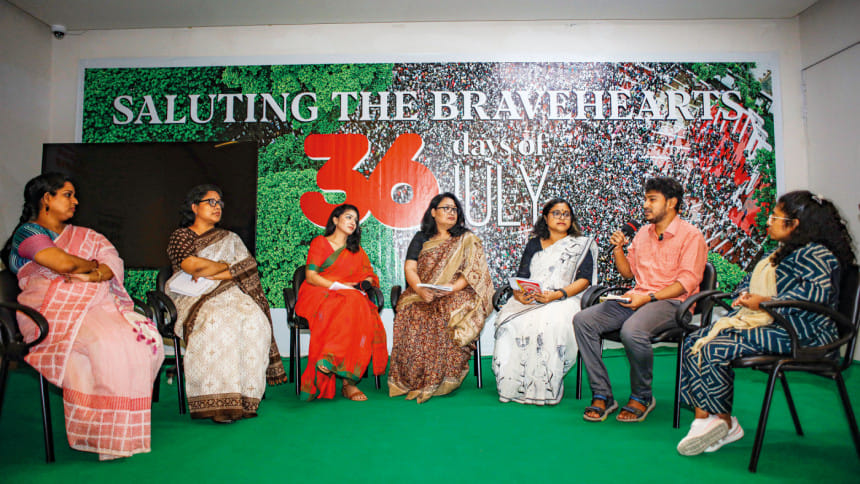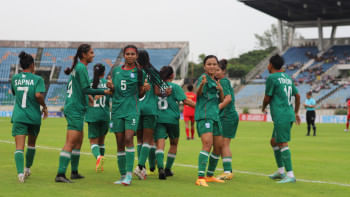Bridging Gaps in Support for the July Uprising Victims

The July Uprising stands as a watershed moment in Bangladesh's history, marking the beginning of a transformative period. This mass movement not only contributed to the nation's democratic aspirations but also brought unprecedented challenges, including widespread violence and casualties.
In response to this crisis, civil society, independent initiatives, and government agencies united to support the injured and bereaved families. However, despite these efforts, gaps in coordination and service delivery remain a major concern.
Volunteer Insights on the Crisis
During The Daily Star's 36 Days of July: Saluting the Bravehearts storytelling event, volunteers shared their experiences and challenges in aiding the victims. The session, titled Courage Amidst Crisis: Stories from Volunteers of the July Uprising, shed light on both their efforts and the systemic failures they encountered.
Lack of Coordination and Monitoring
Farhana Sharmin Emu, organiser of Visionary Voyage, highlighted the interim government's fragmented approach. While there were initial measures, such as forming a sub-committee under the health ministry to identify the injured and missing, these efforts lacked funding and inter-ministerial coordination.
"Three key ministries – health, social welfare, and labour – must work together, involving grassroots stakeholders. However, there's no framework to monitor or ensure accountability at the field level," she stated. She also emphasised the unequal treatment of injured protesters, noting that the poor and marginalised suffered disproportionately.
Barriers to Access
Volunteers such as Liyana Mahfuz from the Chattogram unit of Empowering Our Fighters platform described the logistical and financial hurdles faced by patients traveling to Dhaka for treatment. Despite government promises of free care, ancillary costs, such as transportation and accommodation, posed significant burdens. Furthermore, bureaucratic complexities, such as requiring multiple approvals for medical tests, exacerbated these challenges.
"Patients from low-income backgrounds face the greatest difficulties. They lack both financial resources and social networks to navigate the system," said Shakibur Rahman Rony, another volunteer.
Overlooked Groups
Shoilee Akhund of the Centre for Critical Discourse highlighted how certain vulnerable groups, such as street residents and mentally ill individuals, were excluded from the broader narrative of the uprising. She called for targeted efforts to document and support these overlooked populations.
"Unidentified victims, including those with intellectual disabilities, remain neglected. The government must employ techniques, such as the fingerprint method, to identify and support them," she said.
Lack of Information and Resources
Volunteers also pointed out the absence of a comprehensive database of injured and deceased individuals. Monisha Mafruha, organiser of Chobbisher Uttara, revealed alarming statistics from Uttara: out of 258 individuals, 49 were martyred, and 223 requested urgent assistance. Many faced additional barriers, such as limited computer literacy, which hindered their ability to apply for government aid.
Kaniz Fatima Mithila, an organiser of Loraku Chobbish, provided a deeply moving account of the struggles faced by volunteers and the injured. "We were mentally prepared to deal with critically injured people. However, our trauma began 40-45 days later when we saw people deteriorating due to mismanagement. Proper treatment from the start could have prevented many amputations," she said.
She emphasised the lack of a complete list of the injured or deceased, which continues to be a huge challenge for volunteers working to provide support. "The process of creating these lists is also concerning. These tasks require government coordination."
She also pointed out the duplication of efforts by volunteers. "There was a duplication of efforts, where multiple volunteer teams were working in the same hospital, depriving patients in other hospitals of support. The government should coordinate area-wise teams to avoid this. Each patient has unique requirements, and the government must identify individual needs and respond accordingly."
Every movement brings about significant crises, but the state must rise to the challenge of ensuring long-term rehabilitation for those affected. While private initiatives and civil society play a crucial role, the ultimate responsibility lies with the government to act decisively, mobilise resources, and establish robust systems of care.
The July Uprising was not just a turning point in Bangladesh's history but also a stark reminder of the collective responsibility required to support those who bear the cost of revolution. Without a unified and sustainable approach, the sacrifices of these brave individuals risk being forgotten.
Recommendations
To address these pressing issues and build a more resilient support system, the following recommendations are proposed:
1. Enhanced Coordination Among Ministries: The health, social welfare, and labour ministries must work in tandem, guided by a central task force. This task force should oversee the implementation of measures, ensuring collaboration with grassroots organisations.
2. Creation of a Comprehensive Database: The government should prioritise developing a detailed database of injured and deceased individuals, using modern techniques such as biometric identification to include undocumented victims.
3. Streamlined Access to Services: Simplify procedures for accessing medical care and financial aid. Introducing digital platforms, similar to the COVID-19 Shurokkha app, can help victims and their families apply for assistance with minimal barriers.
4. Focus on Vulnerable Groups: Special programmes must be designed for street residents, mentally ill individuals, and other marginalised groups. These efforts should include advocacy and support networks tailored to their unique needs.
5. Capacity Building for Volunteers: The government should coordinate with civil society to train and deploy volunteers effectively. Area-wise teams can ensure equitable distribution of support, reducing duplication and enhancing efficiency.
Mujib Rahman is a journalist and researcher.

 For all latest news, follow The Daily Star's Google News channel.
For all latest news, follow The Daily Star's Google News channel. 



Comments